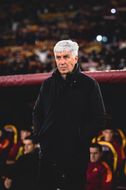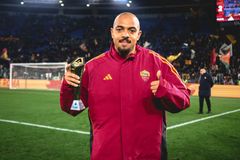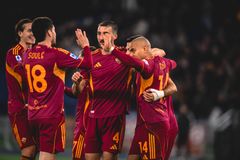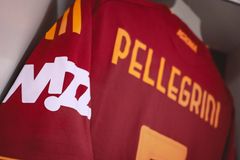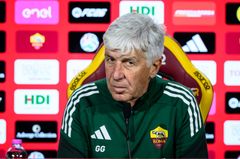
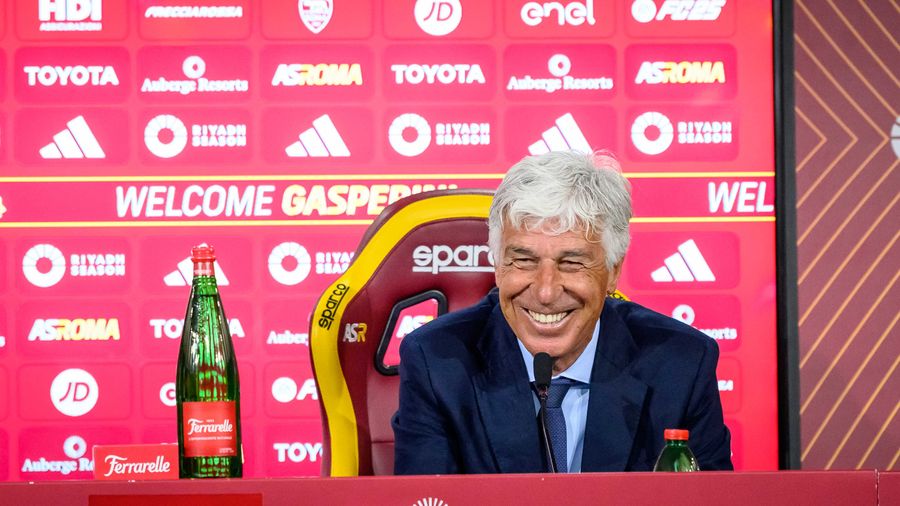
This is what he had to say...
What has Dan Friedkin asked of you? Regular Champions League football? Have you ever wondered why Roma haven't been able to compete for the Champions League spots?
“My first point of contact was Claudio [Ranieri] and he explained everything about Rome and Roma to me in detail. All the ups and downs, the positives and negatives of the last few years. Then I met the owners and they were very enthusiastic about Roma. I don't know if this comes across but from the conversations I had with them it seems they spend a lot of time dealing with and thinking about Roma. They told me about their ambitious plans, which have thus far been difficult to achieve. They saw me – through Claudio – as the right person to build something constructive and strong. We discussed their ideas. We're well aware of the Financial Fair Play situation for the next two transfer windows but there's a strong club and strong owners who want to invest in Roma, perhaps in a more sustainable way than in the past. Above all they want to take Roma high. That was more than enough for me to get a good impression.”
What was it in particular that convinced you to join Roma? And what fears do you have? Maybe looking at this packed press room. Rome is not Bergamo. The dynamics are different. Does that scare you?
“Since I joined, everyone has warned me about the situation in Rome and the fact that it's a difficult city to obtain football success in, for all sorts of reasons. But I think that should be a strength, not a weakness. The fact that there are so many of you. People tell me about all the radio stations and the pressure but from the outside what I see is tremendous enthusiasm, a huge desire for football and for success. We need to channel all of this energy and strength in the right direction. If it's been difficult to achieve the objectives set in recent years, I think we can change that, can't we? We can take things in the right direction so that Roma can be more competitive, especially considering the incredible energy we have here.
“If Napoli managed to win the Scudetto twice in three years, and if Paris has become the capital of Europe not just for tourism but for football, it means that success can be obtained elsewhere. Obviously in order to do that, you have to build in the right way and create all the right situations, but you're all Roma fans so you want what's best for the club, which is exactly what those of us on the other side want too. If we can do that, I think we'll become even stronger.”
How are you going to get on side with the fans?
“I think there's always been understanding with the fans. At the end of the day, it's the results that matter. Then of course you have to see what those results are. What made me decide to take up this challenge is the belief that we can do something good here and raise the bar. Obviously I'm picking up from the incredible results Claudio achieved in the last 23 matches. But that shows you that what matters most is the team. He showed that it's about more than just individual players. They're important of course but he got them more involved, even the players on the bench – they were helping and encouraging. That's something we need to defend and maintain. It's the foundation for building a team. A team that can achieve the maximum possible. You can't make ten-year plans in Rome. You have to be quick and pragmatic. We must take these foundations and build a team on top, and hopefully the fans will identify with the team, with the way they play, take on opponents, win, and sometimes lose. That's my first target, then everything else will come as a result.”
Ranieri said that you're a coach that can change certain players. Do you think you can do that to Paulo Dybala?
“I hope I don't change him because he's a fine player as he is! I hope Dybala is fit and in form – him and many others. There's a team idea that has to be seen in all the players, with everyone pulling in the same direction and no individual priorities. Then of course my staff and I will work with individuals and improve them, be it fitness, technique, tactics, character or whatever. When you improve individuals, the whole team benefits. I've always done that, maybe because I spent a long time working at academy level and I became used to honing players' potential. Those are the targets. No player is unsuitable. They just have to be fit. Dybala is a great player. When he's struggling, you [journalists] appreciate him less too. We have to try and keep players as fit as possible.”
What's your opinion of Artem Dovbyk and Tammy Abraham? How much can they improve? You've got the most out of many centre forwards in your career: Diego Milito, Duvan Zapata, Gianluca Scamacca, Mateo Retegui...
“All those players you mentioned were great players. I don't think I gave them anything more than what they already had. If I can take any credit, it's for getting the best out of what they had. I think the fact that lots of strikers have done well with me is partly down to the way my teams play. We're always among the highest-scoring teams in the league – and sometimes the top scorers. That's a quality of mine and something I want to replicate here at Roma. Of course we'll start with what we have. Any decisions regarding transfers or the possibility to change things will be taken along the way".
Would you be happy if Roma ended 2025-26 in an inferior league position to the campaign just gone?
"I think the best outcome is qualifying for the Champions League. I don't think that at this moment in time Roma are title contenders, but you never know. I think that's the goal we should set ourselves.
"I’m aiming to make this team stronger, with as many Italy internationals and other internationals as possible. I want to put together an increasingly larger core of players who can serve as the backbone of this team and that maybe we can add to next year when we're able to spend more to further raise the bar. By that I mean players who we can’t sign right now but I hope Roma can sign in the future. This is the first part of the project I’m aspiring to put in motion.
"We want a team with a strong core, that’s a tight and solid unit. We want a team that conveys strength, one that’s consistent and well-structured. We’re aiming to have a team with relatively young players, and while it’s clear that there’s always a need for a mix, such players can really give the team a boost.
"Based on what I’ve seen in football this is what’s led teams to grow, even if some players have to be shown the door. Maybe Roma won't need this to do this - I don't know. However, if you’ve got good players at your club who are capable of reaching a high level then it benefits everyone involved."
In light of your experience at Inter in 2011, do you think you'll change your attitude or modus operandi?
"You have to send out strong messages from the outset and get people on your side, but this doesn't mean winning every game or pulling off the impossible. Having said that, you have to give an identity to your team. The fans need to back the team, and that goes without saying. They ought to do so, as they’ve always done.
“This is the biggest ambition - if you manage to create this chemistry with the fanbase then you can better overcome the difficulties that are posed by your opponents. Serie A is a very difficult league. Think about everything that Roma did last time out, then remember that there are also big teams out there who were knocked out of cups, as well as emerging teams that are investing heavily in order to bounce back. It’s not just about the race for the title – teams are gunning to qualify for the Champions League. These teams are pulling away from the pack and creating a gap with the sides below them.
“It’s clear that when you take a job feeling this fired up you have to hit the ground running. By that I mean fostering a strong environment, with a team that buys into your ideas. If you manage to do this then you feel stronger in every regard."
.
You're talking a lot about building a strong nucleus in your team. Taking into account the players currently in the squad, some of whom have been mainstays for years, are any of them more expendable than others?
"First of all, we need to start from what we have, which isn’t half bad. I’m saying this based on what they’ve achieved and the will and spirit they’ve shown - this is what this team has got, and this is what we start with.
“Obviously we can't be the same side. It's normal that I expect us to improve in the transfer window, taking things from a different perspective, signing players to make up the real core of the team, and others to contribute to the squad as a whole. It won’t be a full-scale revolution, but Roma must aspire to strengthen with new players who can take the team to the top."
What kind of players are you looking to sign in the transfer market?
"There are very few teams that can afford to go and bring in established players. You often have to nurture youngsters from the academy or you have to sign up-and-coming footballers with potential to kick on and achieve things. It’s clear that if you’re a high-level team you have to go and get players who can achieve those goals, whether they’re Italian national team players or players who represent other countries, who’ve proven themselves in cup competitions. This is what you aspire to do.
"Sometimes this is the case with up-and-coming players. Take the examples of [Gianluca] Mancini and [Bryan] Cristante. They left Atalanta as young lads but went on to play for Italy. I’d like these lads – regardless of their age – to not only maintain their standards they’ve set so far, but to have their best seasons. By that I mean the best season they’re capable of, and the best of their career. They’ve not reached the stage where they can rest on their laurels and slow down – even if they’re nearing 30 they still need to set their sights high. They’re not old. The same thing goes for 22-year-olds trying to work their way up the pecking order. This must be the spirit. If we can put all this together, then we’ll have a better chance.
"I start my job with these positive foundations, laid by Claudio, who really showed how things should be done here in terms of what the players achieved with their change in performance and results. If you bring this to the table then you’re on the road to achieving your goals. Otherwise you’re merely treading water, which isn’t enough."
Have you got an idea of how to get Lorenzo Pellegrini smiling again? In what role will you play him? What about Matias Soule – what’s his best position?
"Pellegrini is injured at the moment, but as is the case with him and the rest of the lads, they’ve got to show the spirit and the mentality to have the best season possible. You like the version of Pellegrini the one who got stuck in, got in the box and scored goals. Maybe you liked Pellegrini less when he was struggling to perform so well.
"Soule is an attack-minded player. Such players need to score goals, provide assists, take penalties and draw opponents into card-worthy tackles. They must be attacking players, because modern football is especially end-to-end. In football nowadays what matters is being a proper team. What we’re seeing from Paris Saint-Germain is just amazing. They saw [Lionel] Messi, Neymar and [Kylian] Mbappe leave and yet they’re pulling off unprecedented feats in the club’s history. Yes, they’ve got other fantastic and diligently selected players, but that’s what football is all about. The Napoli side that won Serie A did so as a team. You might argue that they were better or worse from certain points of view, but they were a proper team. Those are the best examples. Roma were also a proper team last season.
"These are the principles – nothing else matters. Today football is evolving at an inconceivable speed. You can’t let yourself be left behind, and clubs from other countries are doing really well. Italian football has a few problems at the moment. Atalanta won the Europa League 25 years on from the last time an Italian team had done so, and that’s a bad sign. Roma recently won the Conference League but no Italian club has managed to win the Champions League since 2010. Maybe we need to shed some old habits and start seeing things in a different light. It’s clear that the path to success is different, and in my opinion we need to be heading in this direction."
How much truth was there in the rumours of you joining Juventus before you signed for Roma?
"Indeed there was some truth, but I had the feeling that this was the right choice, notwithstanding the risks that people have been harping on at me about. I thought that given my career, the way I play the game and the impact I can have, this was the right option - a fantastic option - for me to take. I weighed up this situation and determined that it was what I was looking for, what I needed and I’m convinced that I made the right choice."
Can you see what issues Ivan Juric – your successor at Atalanta – might’ve had here?
"I’ve had a different experience in football, even though me and Juric worked for many years together, while he was a player and I was his coach. There was also a period during which he was my assistant. That being said, many years have gone by, and since then we’ve been through different things.
"I have my own way of seeing football but over the years it’s evolved a lot. There are two fundamentals here – if you want to wait for the team to lose the ball or if you want to go and win it. That’s what it comes down to. However, all options are valid - I've seen teams win or lose playing different systems.
“My approach is about working without the ball. I feel a bit bad that it's not always possible, so you have to know how to do a bit of everything. If you ask me what the ideal scenario is then it's being in possession and taking the game to the opponent, but in football you have to know how to do a bit of everything. That’s the crux of the issue, I reckon. Nowadays many coaches take this approach – there have been big changes in football and being versatile is paramount to success. Football is always evolving. What went wrong with Juric at Roma? I don’t know – he’ll have a better idea."
What’s your best quality, and what weak point would you like eliminate from your coaching? How will it feel to play against Atalanta?
"Fortunately we don’t face them until January, so there’s a bit of time. The quality that I see in myself is that that I’m a proper grafter. I like to work. I like the day-to-day involvement in training and I like to see that work in a match or in a player. I like winning over my players. I’ve never imposed anything on my players – I’ve always opted for strong reasoning. Many of the results that I’ve achieved are in part a product of this, but the players deserve full credit for the performances and results. As for weak points... I’m struggling here (laughs, ed.). Sometimes the emotions get the better of me, but this isn’t always necessarily a weak point."
How do you plan on organising fitness training? Will you employ Zdenek Zeman’s infamous step-jumping exercise?
"The thing is, I’ve never put players through this at any point of my career (laughs, ed.). When I was coach at Palermo and we did rondos in the middle of the pitch and we saw the youth team engaging in that exercise, but I never used them. At no point. At the same time, nobody ever died (laughs, ed.). As I said before, it’s important for me that my players have fun. They need to feel the joy of doing the best job in the world. What’s more, they’re at Roma – they should feel blessed.
"Training is fundamental – it’s a big part of the process. As in all professions, it’s about improving. It’s about feeling in good shape and then trying to improve your performances. Training shouldn’t be seen as an obstacle. It’s got to be fun, because football itself is fun. Take Pellegrini as an example - if you don't smile you can't play football. The same goes for Brazilians, who are always laughing - if a Brazilian is sad, he can't play football. Footballers, like other athletes, need to always be in good spirits. You have to establish a good working atmosphere, one where mutual growth is fostered, where everyone involved is presenting the best situations to be able to improve. That’s the aim – it must not be anything else, even a good atmosphere. The atmosphere should never be tense. There are opponents to overcome. The opponents are outside, not inside of the club. Everyone who comes here must have smiles on their faces because it’s hard to get results and every opponent out there has quality."

 Tickets
Tickets
 Shop
Shop















